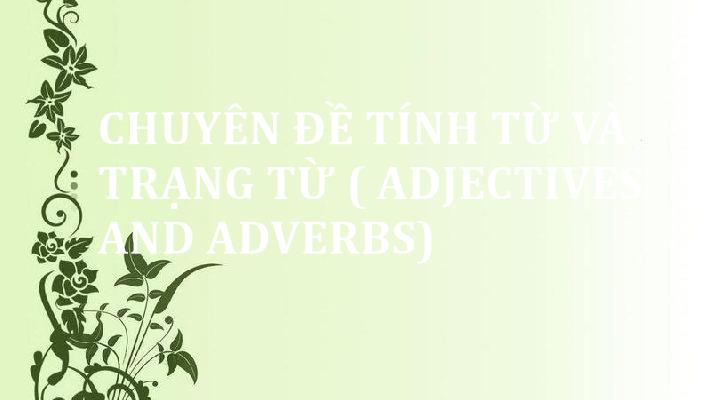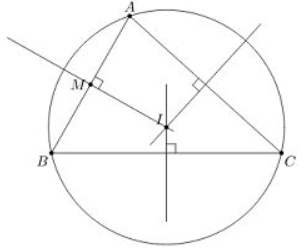INFINITIVES AND GERUNDS
I. Động từ nguyên mẫu có “TO”
1. Cách dùng
• Có thể sử dụng 1 mình hoặc như 1 phần của 1 cụm động từ nguyên mẫu:
We began to walk.
We began to walk down the road.
• Có thể được dùng như chủ ngữ của 1 câu:
To earn money now seems impossible.
* Danh động từ cũng có thể được sử dụng như chủ ngữ của câu khi hành động mang hàm ý chung chung:
Refusing invitations is not always easy.
• Có thể làm bổ ngữ cho 1 động từ:
His plan is to win the match.
• Có thể làm tân ngữ của động từ:
The President didn’t want to tell the truth.
* Tân ngữ này có thể đi trước bằng what, when, whether, how, which…
I don’t know what to do and where to go.
• Có thể làm phó từ chỉ mục đích:
I went to the bookshop to/ in order to/ so as to buy books.
There’s nothing to fear.
2. Những động từ theo sau là “ to – infinitive” : V + to V
1.agree 2.aim 3. arrange 4. attempt
5. appear 6. afford 7. bother 8. claim
9. choose 10. care 11. consent 12. decide
13. dare 14. demand 15. deserve 16. decline
17. desire 18. determine 19. expect 20. endeavor
21. fail 22. guarantee 23. happen 24. hesitate
25. help 26. hope 27. hurry 28. hasten
29. intend 30. learn 31. long 32. manage
33. neglect 34. offer 35. plan 36. pay
37. pledge 38. pretend 39. prepare 40. promise
41. prove 42. proceed 43. refuse 44. resolve
45. seek 46. seem 47. struggle 48. swear
49. tend 50. threaten 51. trouble 52. try
53. undertake 54. vow 55. volunteer 56. would like
57. would prefer 58. would love
Eg: I decided to go with him.
She wanted to become a doctor.
He appeared to be sad.
3. Những động từ kèm theo tân ngữ : V + O + to V
1. ask/tell 2. advise 3. allow 4. admit
5. assist 6. aid 7. appoint 8. bribe
9. beg 10. believe 11. cause 12. command
13. consider 14. convince 15. compel 16. challenge
17. direct 18. drive 19. dare 20. enable
21. expect 22. employ 23. encourage 24. entitle
25. forbid 26. force 27. hire 28. help
29. invite 30. instruct 31. lead 32. need
33. order 34. persuade 35. permit 36. remind
37. request 38. recommend 39. select 40. send
41. teach 42. train 43. urge 44. want
Eg: He encouraged me to learn English.
My mother advised me to take the beauty contest.
*) Notes : Sau các từ dưới đây ta có 2 trường hợp:
advise, allow, admit, permit, forbid, consider, encourage
- + O + to V
- Không có tân ngữ + V-ing
Eg: They allow us to smoke here.
They allow smoking here.
4. Danh từ + to V
1. ability 2. ambition 3. anxiety 4. attempt
5. decision 6. demand 7. desire 8. determination
9. eagerness 10. effort 11. failure 12. offer
13. plan 14. promise 15. refusal 16. request
17. scheme 18. willingness 19. wish 20. way
Eg: His ability to get on well with people impresses me much.
Their promise to build a new bridge was not taken seriously.
5. Tính từ + to V
1. angry 2. glad 3. happy 4. sorry
5. fortunate 6. likely 7. lucky 8. interesting
9. disappointed 10. surprised 11. easy 12. difficult
13. hard 14. anxious 15. able 16. impossible
Eg: I’m happy to receive your letter.
She was surprised to hear the news.
6. 1 số cấu trúc đi với “to-V”
1. S + be + adj + to V
It + be + adj + ( for sb) + to V
Eg: I’m happy to hear that news
It’s difficult for me to learn English well.
2. V + how/ what/ when/ where/ which/ why/ whether…+ to V
Eg: I don’t know how to do this exercise.
I showed her which button to press.
I wonder whether to write or phone her.
3. It costs/ takes + sb+ time + to V
Eg: It takes me 15 minutes to do this test.
4. Mệnh đề quan hệ rút gọn đặc biệt.
The first/ second…/ the last/ the only + (N) + to V
Eg: She was the first person to fly into space.
5. too + adj ( for sb) + to V
Eg: The water is too hot for me to drink.
6. adj + enough + to V
Eg: Mary is old enough to travel alone.
7. It’s + adj ( of you) + to V
Eg: It’s so nice of you to help me.
8. but + to V
Eg: She had no choice but to obey her father.
9. So sánh nhất + to V
Eg: She’s the youngest woman to become president.
10. believe/ consider/ make/ expect/ find/ think/ wonder…+ it + adj + to V
Eg: He found it difficult to park.
11. After “ something, anything, nothing, a lot,…”
Eg: There was a lot to be done.
He talks as if there’s nothing left in life for him to do.
12. adj + N + to-V
• too + adj+ a/an N + to-V
Eg: He’s too clever a politician to say a thing like that in public.
It’s too big a sum of money for him to pay.
• a/an + adj + enough + N + to- V
Eg: He’s a clever enough politician to say a thing like that in public.
• so….as to V/such a/an……………………….as to V:
Eg: I’m not so stupid as to put it in writing.
I’m not such a stupid fool to put it in writing.
• Sau N trong câu cảm thán:
Eg: What an unkind thing to say!
What a way to behave!
13. to-V sau 1 vài cụm từ cố định: to be honest, to begin with, to tell the truth, to put it another way, to get back to the point, to speak frankly…
Eg: To tell the truth, I never like that man.
14. in order to/ so as to / to + V :
Eg: He works hard in order to/ so as to/ to pass the exam.
15. have st to V:
Eg: I have many things to do.
She has some letters to write.
7. Một số cấu trúc khác:
Would like/ love/ prefer/hate + to V
Would you please to V
Be willing to V
Be supposed to V
Make up one’s mind to V
Can’t wait to V
Make sure to V
II. Động từ nguyên mẫu không có “TO”
1. Sau modal V → + V
can, could, may, might, must, will, would, shall, should, have to, ought to, need, be going to, be about to
*) need + to V ( nếu là động từ thường)
+ V ( nếu là modal V)
Eg : I can swim.
She should work harder.
2. Sau 1 số động từ chỉ giác quan
V giác quan + sb/st + V ( chỉ toàn bộ hành động)
+ V-ing ( hành động đang xảy ra lúc đó)
see, watch, hear, feel, smell, notice, observe, find, catch
Eg: I smell something burning.
I saw him steal the car.
3. Sau 1 số động từ khác:
V + sb + V
Make/ let/ help + sb + V
Eg: Let him come in.
She made me laugh a lot.
He often helps me do my homework.
4. Sau 1 số cấu trúc:
Had better + V : nên làm gì
Would rather/ would sooner + V ….( than V) : muốn làm gì hơn
Why not + V…?: tại sao không làm gì?
Eg: You had better study hard.
I would rather/ would sooner watch TV than read book.
Why not ask him to help you?
5. 1 số cấu trúc khác:
* It + be + adj + that + S +( should) + V
important
necessary
desirable
natural
Eg: It is important that he (should ) send her the report at once.
* V + that + S + (should) V
advise/ suggest/ insist/ demand/ request/ require/ recommend/ propose
Eg: He suggested that I (should ) study harder.
III. Danh động từ (Gerunds)
1. Cách dùng
• Có thể được dùng như chủ ngữ của một câu:
Teaching is a hard work.
Smoking is bad for you.
• Có thể làm tân ngữ cho động từ:
Children love reading picture stories.
We don’t allow smoking in schools and in hospitals.
• Có thể làm bổ ngữ cho động từ:
His favorite sport is swimming in this river.
• Có thể làm tân ngữ cho giới từ:
I’m interested in watching TV.
Many people relax by listening to music.
• Có thể được dùng trong danh từ ghép: a travelling bag, a dining room.
• Có thể dùng sau đại từ sở hữu ( my, your, our, his, her…), sau đại từ nhân xưng (him), sau danh từ riêng (John):
He dislikes my working late.
I hope you don’t mind his/ him/ John coming here.
• Có thể được dùng sau từ hạn định (a, the, this, some, a lot of)
The bombing of civilians horrified everyone.
2. Những động từ theo sau là “V-ing”: V + V-ing
1. admit 2. avoid 3. anticipate 4. appreciate
5. advise 6. allow 7. consider/ contemplate
8. delay 9. can’t stand/ can’t help/ can’t bear/ can’t resist
10. deny 11. detest/ loathe/ dread 12. dislike/ hate
13. defer 14. discuss 15. endure 16. enjoy
17. escape 18. excuse 19. face 20. fancy
21. finish 22. forgive 23. feel like 24. give up
25. imagine 26. involve/ include 27. mention
28. keep/ continue/ carry on 29. mean 30. mind
31. miss 32. postpone/ put off/ delay 33. pardon
34. practice 35. prevent 36. quit/ stop/ cease
37. recollect/ recall 38. risk 39. resent
40. report 41. resist 42. suggest 43. save
44. tolerate/ put up with
3. Những động từ đi kèm với giới từ: V + giới từ + V-ing ( 1 số trường hợp thường gặp)
1. accuse of 2. apologize for 3. object to
4. look forward to 5. thank for 6. prevent from
7. approve/ disapprove of 8. congratulate on 9. dream of
10. think of 11. insist on 12. criticize for
13. warn against 14. succeed in 15. give up
16. put off 17. be sorry for 18. be bored with
19. be tired of 20. be fed up with
21. be interested in/ be fond of/ be keen on
22. be afraid of/ be terrified of 23. be used to/ get used to
24. have no intention of 25. have no objection to
4. Một số cấu trúc khác đi với “V-ing”
1. There’s no point in + V-ing:
There is no point in waiting for him.
- 2. It’s no use/ good + V-ing:
It’s no use telling lies.
- 3. can’t/ couldn’t help/ stand/ bear + V-ing:
I can’t help laughing when I see her face.
- 4. be/ get/ become accustomed to + V-ing:
I’m accustomed to living in the countryside.
- 5. look forward to, object to, have (an/ no/ any) objection to, take to, have difficulty/ trouble/ hard time (in), be for/ against, care for, have fun/ a good time, give up, keep on, go on, leave off, put off, see about, …. + V-ing:
I’m looking forward to seeing her again.
He had difficulty (in) finding a parking place.
He put off making a decision until he had more information.
6. be busy/ worth/ risky + V-ing:
My father is busy cutting grass in the garden.
This book is worth reading.
- 7. prefer V-ing to V-ing = would rather V than V
I prefer reading book to watching TV.
- 8. go + V-ing: go sightseeing/ fishing/ swimming/ jogging/ shopping/ camping…
- 9. do + the + V-ing : do the washing-up/ the cooking/ the cleaning…
IV. Một số trường hợp đặc biệt khác:
1. Những động từ có thể đi cùng cả “to-V” và “V-ing” mà không khác nhau về nghĩa:
begin, start, continue, intend, cease, attempt, can’t bear, prefer, omit
→ nhưng thường sử dụng “to-V” hơn
eg: It starts to rain. ( thường dùng hơn)
It starts raining.
• khi các từ trên ở dạng “V-ing” rồi thì chỉ dùng “to-V” theo sau:
eg: It’s beginning to rain.
• khi sau những động từ này là “know/ understand” thì chỉ dùng “to-V”
eg: He started to understand the problem.
2. Những động từ đi với “to-V” và “V-ing” có sự khác nhau về nghĩa:
a) stop:
- stop + V-ing : ngừng làm chuyện gì đang làm
eg: I’m trying to stop smoking.
- stop + to V : ngừng làm chuyện gì để làm 1 chuyện khác.
eg: After 4 hour working, I stop to have a rest.
b) remember:
- remember + V-ing : nhớ đã làm gì
eg: I remember locking the door. ( hành động khóa xảy ra trước hành động nhớ)
- remember + to V: nhớ sẽ phải làm gì
eg: Remember to lock the door! ( hành động nhớ xảy ra trước hành động khóa)
c) forget:
- forget + V-ing : quên đã làm gì
eg: I’ll never forget seeing the Queen.
- forget + to V : quên sẽ phải làm gì.
eg: She’s always forgetting to give me my letters.
d) regret:
- regret + V-ing : hối tiếc đã làm gì
eg: I regret wasting so much time.
- regret + to V : rất tiếc sẽ phải làm gì
eg: I regret to inform you that your application was turned down.
e) try:
- try + to V: cố gắng làm gì
eg: I try to learn English well.
- try + V-ing : thử làm gì
eg: Have you tried eating Chinese food?
f) propose :
- propose + to V: có ý định làm gì
eg: I propose to start tomorrow.
- propose + V-ing : đề nghị làm gì (= suggest)
eg: I propose waiting until the police came.
g) go on :
- go on + to V: chỉ sự thay đổi của hành động, tiếp tục làm 1 việc khi đã hoàn tất các khâu chuẩn bị.
eg: Go on to paint the windows when you have repaired the door.
- go on + V-ing: chỉ sự liên tục của hành động.
eg: He went on working until he was 70.
h) mean:
- mean + to V : có ý định làm gì
eg: He meant to sell his car.
- mean + V-ing : nghĩa là cái gì
eg: Doing this work means going to death.
i) need:
- need + to V : cần làm gì
eg: I need to repair my house.
- need + V-ing : cần được làm gì
eg: My house needs repairing.
* need có thể thay bằng want/ deserve
j) like/ love:
- like/love + to V: thích, muốn làm gì vì thấy nó tốt, bổ ích, sở thích nhất thời, không lâu dài.
eg: I like to go to cinema tonight.
- like/love + V-ing: sở thích lâu dài, đã trở thành thói quen.
eg: I like getting up late every morning.







